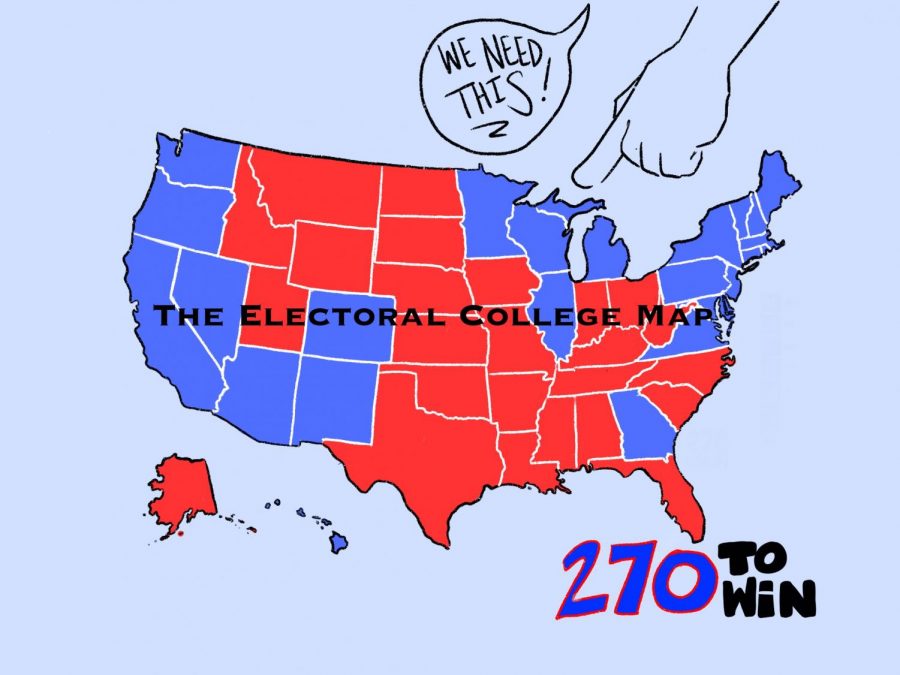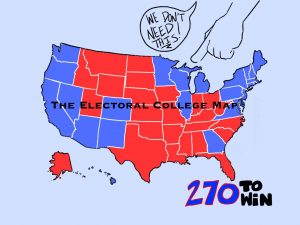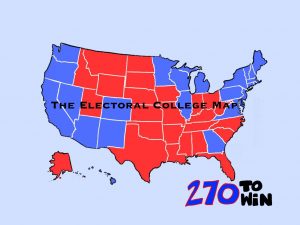Why we should have the Electoral College
Photo by Sophia Novelo
Many students believe we do need the Electoral College to ensure a fair presidential election.
December 9, 2020
American politics have always played a divisive role in the once casual conversation, especially when the existence of the electoral college gets shoved into the spotlight. Following the 2020 election, the argument on the true purpose of the electoral college continued as many began to question the system. It’s true, the electoral college is very complicated, but in the current fragile political state, we’ve never needed the electoral college more.
“The electoral college is important because it gives the general population of each state representatives to vote on their behalf. Most electoral votes align with the popular votes of the state that they represent. This is important because using the electoral college system, an election won’t solely be based off of congress or the popular vote, allowing representation while following the general stance of the public,” Brooklyn Esposito (11) said.
The electoral college is composed of 538 total electors with each state having as many electors as their combined total of senators and representatives. Each year they come together to decide the fate of each presidential election. The first candidate to reach 270 electoral votes (50.19% of the electoral votes) wins the election regardless of the results of the popular vote, as seen in the 2016 election. The system was instituted in fear that too much democracy would mean that the American people would not be able to make smart political decisions.
“The majority of voters were uneducated when the college was put in place and the electoral college served as an intellectual filter for what political choices would be made. Nowadays, I feel like a popular vote would be better since there are way fewer uneducated citizens and an enormous increase in schooling and literacy…I understand that it was also put in place so that small states wouldn’t be drowned out by the bigger ones, but you also have to consider how weird it seems now. It makes no sense that an electoral vote from a more rural state with a smaller population that represents fewer people has more power than an electoral vote from a more urban state,” Audrey Gutierrez (11) said.
Although the electoral college is popularly thought to give an extensive amount of power to competitive states, otherwise known as swing states, that can be won by either democratic or republican parties, the electoral college actually levels the playing field for the disadvantaged states. When population comes into thought, there is an immense amount of unfair distribution of votes in each state. Smaller groups like Iowa potato farmers and Wyoming oil worker votes would be trumped by California factory workers alone. The voter distribution keeps smaller rural areas from being marginalized and encourages all parts of the United States to participate in selecting the next president.
“Being that the nation is comprised of a large number of states at varying populations, without the electoral college smaller states would seldom campaign in or represent being that there wouldn’t be a large enough population to make much of a contribution throughout elections. Without the electoral college, however, smaller states provide anywhere from three to six electoral votes, motivating candidates to campaign and represent these smaller states as their votes would provide great value; therefore, the political values of each state is accurately reflected throughout an election and the general consensus/vote is fairly represented between smaller and larger states- a just and fair election is then created,” Alyssa Slater (12) said.
Ever since its creation, the electoral college has guided the United States through presidential elections, leading to America’s consistent dependency on the system. While there are currently 700 proposed amendments to modify or abolish the college, it’s unlikely it will ever be removed from our democracy. Our modern day election process calls for our old-fashioned electoral college. It’s not “outdated” or “unnecessary,” it is fundamental to the continuation of our fair and representative presidential elections.







